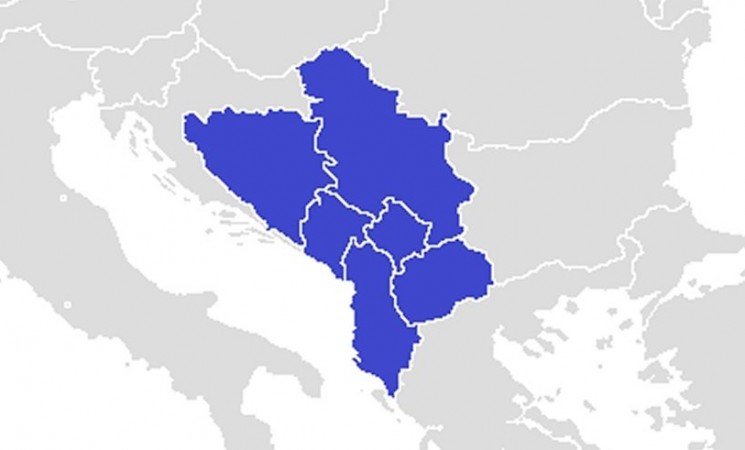On December 12, 2019 the National Committee on American Foreign Policy hosted a delegation of distinguished leaders from the Western Balkans organized by the Nizami Ganjavi International Center. The group gathered to discuss how the Balkans now rests at a crossroads, and what the future of Euroatlantic integration might look like in the near term.
The leaders from the Balkans began by discussing the history of their region, in which people from different religions and ethnic backgrounds lived together in relative peace for many centuries under several European and Eurasian imperial powers. The world wars of the twentieth century disrupted the regional order, but relative peace was restored during the Yugoslav period after World War II. However, after the dismantling of Yugoslavia, nationalism and fragmentation generated ethnic and religious conflicts. This attracted the attention of Europe and the United States, and the U.S. played a major role in forging the Dayton Accords under the inspired leadership of Ambassador Richard Holbrooke.
Today, however, attention of the United States and the European Union on the region has waned, and the Western Balkan participants stressed the critical need for renewed attention from the United States and the European Union. They shared that outside influence from actors such as Russia and China is now playing an outsized role in the politics and economics of many countries—with China, in particular, gaining a strong hand with infrastructure investment. One participant lamented the once-great attention paid by the United States and Europe, writ large, on the Balkan Peninsula, citing their focus on post-Yugoslav state-building, wars, and reconciliation. This period now seems forgotten, however, as promises to Balkan nations have been made and broken with no recourse.
There was also a general air of pessimism throughout the region resulting from French President Emmanuel Macron’s veto of further European Union expansion in response to North Macedonia and Albania’s overtures to join. They viewed his remarks as a crushing blow to the aspirations of many others in the region. Participants shared their belief that the European Union had lost a great deal of credibility by failing to open accession talks with North Macedonia and Albania.
Responding to a question about the role of Islamic-majority nations on the Balkans, one participant noted that, while some cultural affinity exists given the large Muslim population of the region, nations such as Turkey are simply filling a void. Alongside Russia and China, other powers will seek to exert influence where they can in their near-neighborhood. Yes, the Islamic connection is important, but exerting influence on the balance of power is imperative for external actors in the Balkans.
Other participants called particular attention to the economies of the region and on the ever-feared “brain drain” that painfully impacts the future leadership of developing nations. The importance of developing domestic enterprises and businesses to offer jobs and opportunities for young people was mentioned as a vital area to focus on for those seeking to offer policy recommendations. However, the greatest challenges preventing such development, as a participant suggested, are continued political uncertainty, and flight from the countries of the Balkans. “Brain drain” demonstrably saps needed leadership, ingenuity, and youthful vigor from countries in desperate need of it, while political uncertainty drives away risk averse investors. The nations of the Balkans will also need to reconcile even greater numbers of emigrants as they, ideally, move closer to the European Union. As travel restrictions ease, more key contributors to economic health will likely seek more fruitful environs.
One participant brought up the idea of NATO expansion, suggesting that Western nations dropped the proverbial ball by failing to admit Georgia and Ukraine into NATO, opening the door to malign influence in these nations that has had a trickle-down effect. The United States and the European Union should take these cases as cautionary tales for what may happen when denying opportunities to those deeply committed to Western alignment, indicating that countries in his region ought to be considered for NATO membership.
Ultimately, the roundtable participants all agreed that the United States and the European Union should be paying closer attention to the Balkan region. Some suggested that supporters exist in the U.S. Congress and among certain entities in Europe, and these relationships should be explored. However, until the outcome of the U.S. presidential election in 2020 is known, it will be difficult to exert pressure on any particular actor, or institution. Until then, organizations like the National Committee on American Foreign Policy and the Nizami Ganjavi International Center must keep convening thought leaders and interested voices in an effort to ‘keep the conversation going,’ and keep a steady eye on the Western Balkans.

